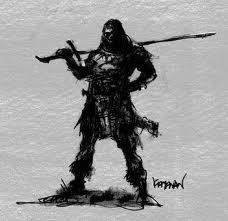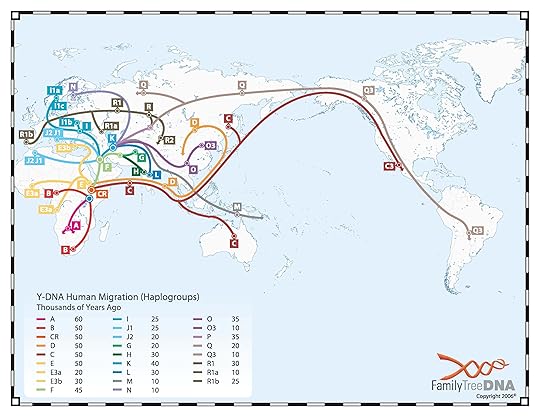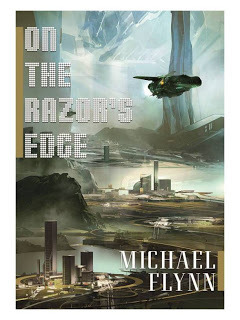Michael Flynn's Blog, page 21
May 26, 2013
Odds and Ends
May 22, 2013
A Few Cutting Remarks

Don't mess with Teodorq or Conan
Teodorq sunna Nagarajan, a supporting character in Up Jim River and the protagonist in "The Journeyman: On the Shortgrass Prairie," now finds himself confronted with a duel in "The Journeyman: In the Stone House." The duel is being fought with longswords, since the society he finds himself among is of a late medieval character.

Don't mess with the chicks, neither
Now, TOF has never dueled with longswords, nor indeed with any fell instrument, so for versimilitude, he consulted that Font of All Wisdom; viz., the Internet, to obtain nuggets of neepery with which to strew his narrative. There is a veritable cornucopia of such info Out There, which TOF judges reliable since it does not involve God or Darwin. Fighting with longswords is quite intricate, with a number of guards and thrusts, a three-fold division of the combat, and sundry other technologia. Who knew. Those Western oafs, unlike the refined Japanese samurai, were supposed to merely flail and hack at one another with big clumsy blades of sharp steel. But it seems there was some art to it after all.
Read More Here
May 17, 2013
America's Next Top Model
Read more »
May 16, 2013
Fun With Statistics - the Saga Continues
Read more »
May 15, 2013
Publishers Weekly Weighs In
*On the Razor's Edge
Michael Flynn Tor $25.99( 352p) ISBN 978-0-7653-3480-0
Flynn's fourth far-future tale of interstellar adventurer Donovan buigh (after In the Lion's Mouth) continues to impress with lyrical writing and a complex plot. Millennia into the future. humankind has spread among the stars. Language has drifted, cultures have mixed, and governments rise only to fall. The Confederation -- home to Holy Terra -- is embroiled in a secret civil war. The rebel Shadows, seeking the key to the Secret City of the ruling oligarchy of the Names, have Donovan, who once entered the Secret City by unknown ways. The snag is that Donovan forgot his past when his mind was riven into ten personalities by the Shadows. Meanwhile, Ravn Olafsdottr entices the harper Mearana, Donovan's daughter, to attempt a rescue of her father and perhaps draw the Hounds of the Ardry into the conflict. As the covert war breaks into open revolution, true allegiances are revealed, enemies become allies, and the moribund Confederation quakes. By blending the textual and tonal elegance of ancient sagas with future technology, Flynn connects humanity's past with its future in an epic transgalactic prose poem. (July)
+ + +
IOW, it is Way Kool.
Hoo-Ah!
First review of On the Razor's Edge
a starred review from Booklist.
On the Razor's Edge.Flynn, Michael (Author)
Jul 2013. 352 p. Tor, hardcover, $25.99. (9780765334800).
On The Razor’s Edge is a magnificent and satisfyingly open-ended conclusion to the tale of the civil war between the Shadows of the Names. The Harper, Méarana, is kidnapped by Ravn Olafsdotter or, more accurately, manipulated into venturing to Terra to rescue her father, and Bridget ban, as Ravn and Méarana know, follows with a pack of Hounds. Gidula, one of the rebels, holds Donovan, demanding that he retrieve the secrets held between the fractured personalities of his mind. Flynn’s epic style, applied to a semimedieval culture in a space-opera backdrop, continues to be greatly compelling. There are layers of conspiracy and secrets, both because of history so ancient it has passed beyond legend and as a result of the complex duplicity involved in the dealings of Those of Name. There is a spectacular showdown at the end, a battle quite worthy of all that has gone before, and a fascinating narrative of regime change and rebellion. It is a beautifully told story with colorful characters out of epic tradition, a tight and complex plot, and solid pacing.
— Regina Schroeder
Magnificent! Epic style! Greatly compelling! Fascinating narrative! Beautifully told! Colorful characters! Tight and complex plot! Solid pacing!
TOF naturally blushes; but who is he to protest against such expertise?
+ + +
May 13, 2013
Bats in the Belfrey

Not a bird
Every now and then one stumbles upon comments about how the Stoopid Bible™, written by Bronze-Age [sic] goat-herders who didn't know Jack, somewhere or other seems to include bats among birds. How droll! Those sillies!
Now when sometimes it is pointed out that the New Guinea highlanders likewise classify bats as birds, they will oft hesitate, reluctant to refer to certified Victims of Indonesian Western Imperialism as stoopid, but then, after a quick look around the room, will lower their voices and crow that this proves their very point. Even though they did not have the Stoopid Bible™, the New Guineans were somehow also Backward and Very Confused about the True Nature of Birds. This latter is also very droll, since these same people are often at great pains to deny the very existence of natures. Read more »
May 12, 2013
Sometimes They Don't Read What They Done Wrote

BONUS LINK: Where is Global Warming When You Really Need It?
May 10, 2013
Can a Plot Become Obsolete?
Galactic empires, decline and collapse of.
Time travel, serial closed loop.
Alien contact, hidden aliens among us.
etc.
Inspired by the four-letter classification of alien beings in James White's Sector General stories, Young TOF set about taxonomizing all of his SF books and short stories with 4-letter codes. The details are now thnakfully lost in the mists of time, but the first letter was a broad overall category, such as the aforesaid galactic empire; the next level, a detail within that category, such as galactic empire in decay; and so on. The whole thing eventually was set aside. Was a story about an alien galactic empire classed under Aliens or under Galactic Empire? Still, TOF could not shake the feeling that there were underlying structural similarities among groups of stories.
Later, it turned out he was not alone.
Enter PoltiGeorges Polti (1867-1946) was a French writer, critic, and theorist - and what self-respecting French litterateur is not a theorist? - who possessed a masterful command of the theater. Based on a remark by Goethe that there were 36 dramatic situations - and Schiller's inability to find even that many - he set about cataloging and typing them, supplying for each situation examples from ancient and modern theater, occasional novels, and even historical and everyday events. Criticized by Etienne Souriau for artificially tweaking the list in order to achieve the magical 36, he did not, in TOF's undeniably humble opinion, achieve a true taxonomy, in that the canonical 36 were not apparently organized as to species, genus, and family. Some indeed seemed to be the same situation, though they may have appeared distinct to those with the sensibilities of an earlier generation.
M. Polti did not claim there were 36 plots. He claimed there were 36 distinct dramatic situations. A plot is a series of encounters. A novel might contain several of these situations; a short story may revolve around only one. About one of the Situations, the first one, he made the curious observation that:
It is apparent that, in the modern theater, very little use has been made of this First Situation.
Can a Dramatic Situation go obsolete? Why would this Situation fall into disuse?
We'd tell you (TOF hears you say) if you would tell us what the @#$% this Situation is!
TOF is glad you asked.
Read more »
Unclear on the Concept
Fearless Leader wants to put us all in our place, tweeting us that
"Unless you're a Native American, you came from someplace else."--tweet, @whitehouse, May 8
Now, to be a native of some place you must have been born in that place, so the tweet is self-contradictory.
But let us suppose good ol' @whitehouse really meant "unless you're an American Indian (Amerind)" and was merely employing the incoherent vocabulary forced upon devotees of delicate speech.
In that case, it is also an improper proposition. TOF is not a Native American in that sense, but does "come from" the very place from which he is this very moment blogging; viz., a quondam mill town on the Pennsylvania-Jersey border. This falsifies the proposition. (modus tollens) QED and up your nose.
But perhaps @whitehouse meant one's ancestors came from somewhere else - save for the Amerinds. This raises all sorts of worrisome thoughts about Rasenwissenschaft and Blood, soil, and honor. Why should it matter where from and when one's ancestors came?
Then the tweet is also historically incorrect. Because the ancestors of the Amerinds also came from someplace else (i.e. NE Siberia across the Bering Land bridge some 20,000 years ago).
But perhaps it meant to say that everyone in America has ancestors who came from somewhere else, with magic exemptions given to Amerinds, Athapaskans, and Eskaleuts.
In that case, it is merely a fatuous tweet - but I repeat myself. Pretty much everyone everywhere has ancestors who came from elsewhere. Arabs in the Middle East came from Arabia; Peninsular Arabs claim the Yemen as their origin. Genetic evidence suggests proto-Australoids canoing out of Africa along the coast as the original Yemenis. (They also dropped their genes in southern India, Thailand, Indonesia, New Guinea, the Philippines, Japan (Ainu), and likely account for the Pre-Siberian American Aborigines.)

The C-route is that of the proto-Australoids
Michael Flynn's Blog
- Michael Flynn's profile
- 237 followers




